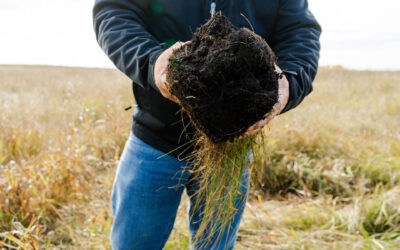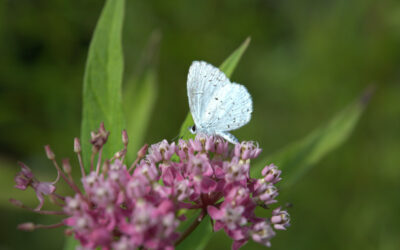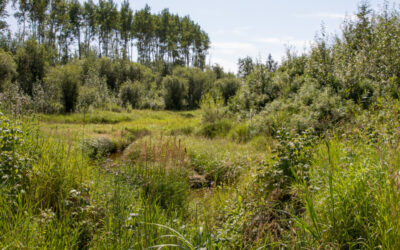High-school students get hands-on lesson in planting native species to produce beneficial ecosystem services on an ALUS Elgin farm.
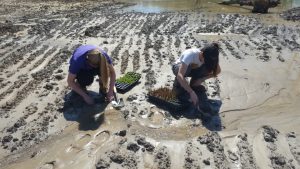
Students from East Elgin Secondary School planting 100 native trees, shrubs and wildflowers for pollinators and wildlife, in the riparian zone surrounding a wetland at an ALUS Elgin farm.
On April 24, 2017, a group of high-school students devoted a full day to helping their local environment. ALUS Elgin Program Coordinator Alyssa Cousineau invited nine students from East Elgin Secondary School’s Environmental Leadership Program to help establish native wildlife habitat on an Ontario farm.
“Young people are the leaders of tomorrow, and these particular students have a very strong interest in the environment,” said Cousineau. “ALUS represents the future of conservation in Canada, so it was a great match!”
Guided by ALUS Elgin participant and supporter Stephen Hotchkiss, the students toured the 384-acre farm, situated along the Otter River in Elgin County, which currently has 40 acres enrolled in the ALUS Elgin program. A former tree nursery, the Hotchkiss family farm now raises bees and grows herbs, fruits and mushrooms, transforming these ingredients into packaged products that are sold at a general store in nearby Port Stanley, and distributed to restaurants and retailers across Canada and the US. Through their guided tour, the students learned how the Hotchkiss family integrates conservation projects into the operation of a profitable farm.
“Hosting demonstrations and workshops on our farm is an important part of our business,” said Hotchkiss, “as it allows consumers to engage directly with the agricultural and environmental processes involved in the production of their food.”
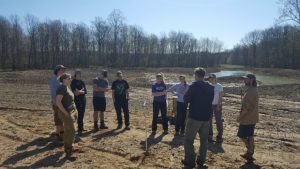
“Hosting demonstrations and workshops on our farm is an important part of our business, as it allows consumers to engage directly with the agricultural and environmental processes involved in the production of their food,” said Stephen Hotchkiss, who welcomed a group of high-school students for a planting field day in ALUS Elgin.
The young visitors also planted more than eight acres of wildlife habitat that day, including six acres of pollinator habitat and two acres of riparian zones.
The pollinator habitat was established as a groundcover on a newly reforested section of the farm. The students hand-seeded by walking the area in parallel lines, broadcasting handfuls of seed as they went. The seed contained a diverse mix of native wildflowers and grasses, including compass plant, common milkweed, wild bergamot, big bluestem, Indian grass and switch grass. This ALUS project will provide quality habitat for native bees and other pollinators, thus enhancing the diversity and health of the forested area of the farm, which is helping produce cleaner air in the local area.
The high-schoolers also enhanced the riparian zones around two wetlands, where they added more than 100 trees and shrubs native to the Carolinian region, such as buttonbush, Chinquapin oak, common elder and New Jersey Tea, as well as wildflower species such as sedges, blue vervain, monkeyflower, marsh marigold and meadowsweet. They transplanted seedling plugs and sowed an additional 2 kg of seed between the plants. This enhanced riparian zone ALUS project will produce valuable wildlife habitat for many species, while also helping to filter field runoff before it enters the wetland, thus keeping the water cleaner for people downstream.
“It was a great day and we all had fun getting out there and doing something concrete to benefit our environment,” said student Amanda Bartch. “The land we planted will help birds, bees and butterflies, and it will help keep the water clean—these are things that I think the whole community can appreciate.”
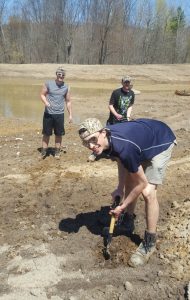
“Young people are the leaders of tomorrow, and ALUS is the future of conservation in Canada, so it’s a great match!” -Alyssa Cousineau, ALUS Elgin Program Coordinator, who organized a planting field day on a local farm for students from East Elgin Secondary School.
—
THANK YOUS
This student field day was organized and hosted by ALUS Elgin, a partnership between the Long Point Region Conservation Authority and ALUS Canada, A Weston Family Initiative.
ALUS Elgin was able to purchase enough plant material to establish these wetland and riparian habitats thanks to a $21,000 grant from the Great Lakes Guardian Community Fund (from the MOECC). Other funders for this particular ALUS project included Elgin Clean Water and the Long Point Region Conservation Authority. The Tall Grass Prairie seed was sourced from Joe Csoff, while the riparian seedlings and seed were from Craig Bradford at St. Williams Nursery. Thank you to all these parties for their support.
ALUS would also like to thank Duncan Sinclair and all nine energetic students from the Environmental Leadership Program of East Elgin Secondary School, for your enthusiastic help. We hope you enjoyed your hands-on lesson about the beneficial ecosystem services produced on a farm!
And thanks once again to our host, Stephen Hotchkiss at the Hotchkiss family farm.
—
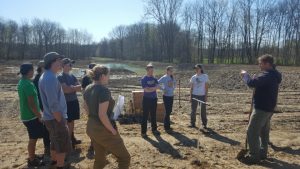
On April 24, 2017, students from East Elgin Secondary School’s Environmental Leadership Program devoted a full day to helping their local environment through ALUS Elgin. They planted eight New Acres™ with native species, including six acres of pollinator habitat and two acres of riparian zones. These ALUS projects will produce valuable wildlife habitat for many species of birds, bees and other wildlife, and help produce cleaner air and cleaner water for the benefit of the community.

